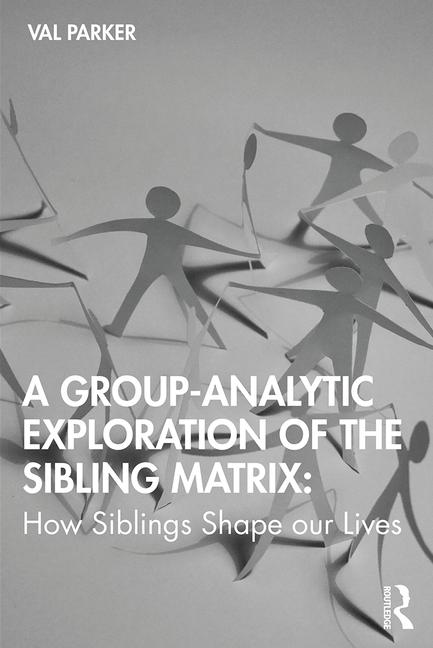writer of A Group-Analytic Exploration of the Sibling Matrix and contributor to journals including The International Journal of Group-Analytic Psychotherapy and Psychodynamic Practice

A Group-Analytic Exploration of the Sibling Matrix: How Siblings Shape our Lives
A fresh approach to siblings, recognising how these relationships are embedded in the framework of the family and how sibling experiences shape our lives, influencing relationships with partners, friends and colleagues, and affecting how we take our place in groups and in society.
The book is divided into three parts. Part One focuses on the sibling life cycle, exploring how these relationships shift and change throughout life according to context and circumstances. In Part Two, Parker uses clinical examples to consider how therapists working with individuals and groups might expand their thinking to incorporate the sibling matrix. The final part investigates how the sibling matrix manifests in organisational life and considers how we might develop mutuality and cooperation in our universal sibling matrix.
The book incorporates compelling personal stories and clinical examples to bring to life the realities and nuances, the good and bad, the healthy and supportive, and also the potentially damaging aspects of sibling relationships.
Reviews
‘Using pithy vignettes from her own clinical practice and from her own life, [Parker] draws the reader into an exploration of this neglected topic and makes a compelling case for analysts and therapists to pay much greater attention to it. The relative brevity of the book was a strength. I felt that I was there at the opening of a conversation, which left me buzzing with thoughts and observations, eager to join in.’
Papers
Over the past 20 years I have contributed articles to many journals and publications. These include the following:
A counsellor’s personal reflection on facilitating a ‘Balint group’ for GPs
Psychodynamic Practice, 2010 16:1 pp79-88
When I was working as a counsellor in Primary Care I became fascinated by how the relationships between GPs and their patients affect medical consultations. I was therefore very interested when a GP asked for my help in exploring his inexplicable anxiety about his work. During our discussion we realised that much of his anxiety focussed not on concerns about his patients, but on his struggles with time keeping. We began to wonder how this impacted on his relationships with his patients, and how his ability to assert himself varied according to the feelings evoked by individual patients.
An exploration of the concept of the social unconscious and its application to clinical understanding
Group Analysis 2014 47:1, 30-41
The social unconscious is an idea primarily linked to group analysis. This article argues that the unconscious is socially constructed and it is essential that we recognize the power of social forces on our psyche. While Freud’s concept of the super-ego implies the existence of a socially constructed aspect of the unconscious, I propose that if the unconscious is inherently social then the anxieties we experience and defend against are based on our need to belong rather than our fear of annihilation. Tracing these ideas through three individual case examples, I demonstrate that the cultural and societal roots of the unconscious are crucial to our understanding of the workings of individuals and of the groups to which they belong.
The individual is an ‘artificial, though plausible, abstraction’ (Foulkes, 1948): The relevance of Foulkes’s group-analytic ideas in our world today
Psychodynamic Practice, 2017 23:1, 72-79
As human beings in the early twenty-first century we are living an increasingly paradoxical existence. It seems as though we are constantly being encouraged to isolate ourselves from one another and live a virtual life without human contact. We have numerous forms of personal entertainment; food can be delivered; our money is handled by computers; we don’t even need to leave our homes to go to work. Yet we cannot do without each other. Social networking sites and mobile phones have an almost obsessive, addictive quality for many people. We are encouraged to have numerous ‘friends’ and to be in touch with them all the time. We can be contacted wherever we are, however remote. This extraordinary contradiction brings to mind many questions. What does it mean if we try to separate ourselves from others? Can we exist in isolation? Who are we if we don’t have others to help us define ourselves?
Siblings under lockdown. Has there been an upside?
Sibling witnessing in the horizontal axis. Response to 46th Foulkes Lecture by Miriam Berger: May 2023
Book Reviews
The Social Unconscious in Persons, Groups and Societies: Volume 3: The Foundation Matrix Extended and Re-configured
Edited by Earl Hopper and Haim Weinberg
Developing Nuclear Ideas: Relational Group Psychotherapy
Richard Billow
François Lèvy
Sibling Relations in the Horizontal Axis in Theory and Practice: Contemporary Group Analysis, Psychoanalysis and Organizational Consultancy (New International Library of Group Analysis)
Edited by Smadar Ashuach and Avi Berman
Cat Brushing
